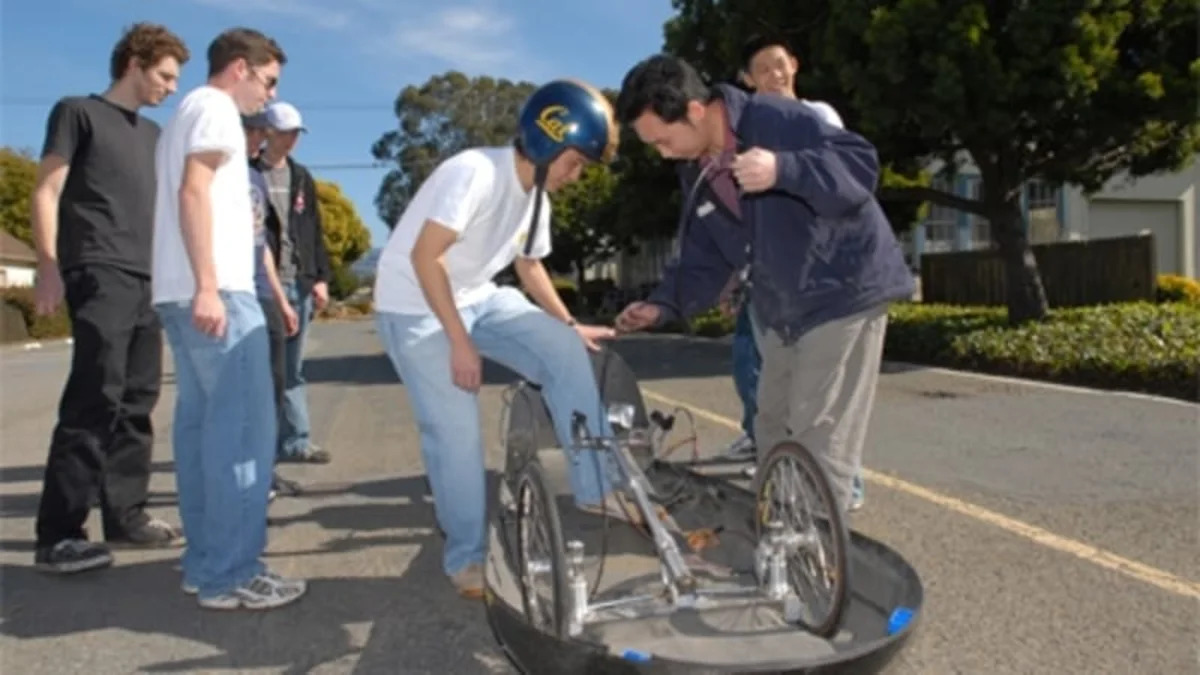The all-time highest mpg (equivalent) rating achieved at a Shell eco-marathon is 10,705 miles per gallon. That record was set in 2003 at the European Shell Eco-marathon. The Shell Eco-marathon returns to the United States next month and will see students try to squeeze every last centimeter out of the fuel with ultra-aerodynamic, lightweight body coffins. The event kicks off April 14 at the California Speedway in Fontana, California and will feature student teams from across the Americas. The UC Berkeley team is seen above and in the gallery.
The vehicles in the competition have three or four wheels and can use conventional fuels or alternative fuels/sources of energy (liquid petroleum gas, biofuels, compressed natural gas, hydrogen or solar) and are vying for a $10,000 grand prize (given to the winning school). Whoever goes the farthest on the least amount of fuel wins. More after the jump.
The vehicles in the competition have three or four wheels and can use conventional fuels or alternative fuels/sources of energy (liquid petroleum gas, biofuels, compressed natural gas, hydrogen or solar) and are vying for a $10,000 grand prize (given to the winning school). Whoever goes the farthest on the least amount of fuel wins. More after the jump.
Related:
- European Shell Eco-Marathon contestant hits 6785 mpg
- Hypermiling update: Shell Eco-Marathon coming back to the U.S. next year
Shell Eco-marathon™ Americas Inspires Top Young Engineers from 24 Schools in the U.S. and Canada
Eco-Friendly Challenge to Take Place April 13-14 at the California Speedway in Fontana , California
Houston – After more than 20 successful years in Europe and the United Kingdom , the world-renowned Shell Eco-marathon™ is coming to the United States . The Shell Eco-marathon™ Americas will showcase a line-up of futuristic, eco-friendly vehicles competing to travel the farthest distance on the least amount of fuel. The student project, which invites student teams from across the Americas to design and build the most energy-efficient vehicle, will conclude with a two-day mileage challenge, April 13 -14, 2007, at the California Speedway in Fontana , California. Last year, a student team from Europe achieved the equivalent of 6,792 miles to the gallon.
"As a leading provider of fuels today, we believe it's important to encourage education and awareness about sustainable mobility," said David Sexton, president of Shell Oil Products U.S. "We've made it a priority to support today's top young scientists and technicians as they develop creative ideas that could help solve real energy problems and influence the transportation of tomorrow."
Teams are comprised of about eight students working together to build proto-type vehicles with three or four wheels using conventional fuels or alternative fuels or energy sources such as liquid petroleum gas, biofuels, compressed natural gas, hydrogen or solar. A grand prize of $10,000 will be awarded to the educational institution or university whose student-driven vehicle completes the farthest distance with the least amount of fuel. There are also first, second and third prizes awarded in three vehicle categories. Thirty teams from across the U.S. and Canada are registered to participate in the Americas event.
Throughout the entire process, the Shell Eco-marathon™ offers students – who are interested in the world of technology, energy and transport – a unique opportunity to work hands-on to identify possible solutions for meeting future energy needs.
"Shell has one of the broadest fuel portfolios, and vast experience in developing innovative and new fuels to meet society needs," added Sexton. "Educating our young people about sustainable mobility is critical to achieving energy security for the future. Shell is proud to provide students with an educational platform to explore and experiment with technology and fuels, and to develop creative and inventive mobility solutions through the Shell Eco-marathon™ project."
From vehicle design to financing, student participants gain hands-on experience managing their project and applying skills in science, technology, mathematics, business and design. Along the way, they demonstrate hard work, creativity and ingenuity, while addressing one of the most pressing issues in today's society: sustainable mobility.
Currently, the 2007 European Shell Eco-marathon™ is set to be the biggest ever, with more than 250 teams from educational institutions in 20 different countries. The key challenge for each team is not only to create the most fuel-efficient vehicle, but also to beat the European Shell Eco-marathon™ fuel-efficiency records. For combustion engine entries, the record was set in 2004 by the team from Lycée La Joliverie, France, who reached 3,410 kilometers (2,118 miles) on just one liter of fuel. For proto-type vehicles using fuel cells, the record is even more impressive with a hydrogen-powered vehicle built by Swiss team ETH Zurich in 2005 achieving a projected 3,836 kilometers (2,383 miles) on the equivalent of a single liter of fuel. The 2007 European Shell Eco-marathon™ event will be held at the Nogaro Racing Circuit in the South of France on May 11-13, 2007.
The Shell Eco-marathon™ is just one example of the initiatives Shell is pursuing in the area of innovation and technology related to sustainable mobility. Shell has invested more than $1 billion in alternative energies over the past five years, making it one of the world's leading companies in the sector. In addition to the thousands of scientists that Shell employs around the world, Shell has appointed a Chief Technology Officer, seven Chief Scientists and established a high-level forum to ensure that Shell continues to innovate at the forefront of the industry. Shell is also proud to be working in partnership with vehicle manufacturers, governments, academic institutions and non-governmental organizations to develop innovative ideas and attainable solutions to meet the growing demands of energy for transportation.
More information, including a complete list of student teams, is available at http://www.shell.com/us/ecomarathon.



Sign in to post
Please sign in to leave a comment.
Continue